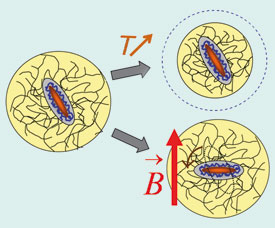Swiss researchers have synthesised microgel particles that are responsive to both temperature and a magnetic field. This could lead to improved targeting in drug delivery systems.
Microgel particles prepared from stimuli responsive polymers have been extensively studied in the past for applications such as drug carriers in targeted drug delivery applications. They are well known to be responsive to changes in temperature but now Hervé Dietsch and co-workers from the University of Fribourg have prepared microgel particles respond to magnetism as well as temperature.
Dietsch prepared poly(N-isopropylacrylamide) hybrid microgels (PNIPAMs) and embedded an iron oxide rod in the core. The microgels are responsive to temperature and the shape of the magnetic rod allows their orientation to be controlled by a magnetic field. Combining temperature sensitivity with magnetic features could open up many possible applications for the microgels, such as controllable tracer particles in targeted drug delivery, or as building blocks for switchable materials in nanotechnology.

Magnetic iron rods inside the particles allow the orientation to be controlled
|
Walter Richtering, a microgels expert from RWTH Aachen University in Germany says this work will have very high impact. 'It is very exciting that one can now rotate spherical particles simply by applying a magnetic field while keeping the special surface properties of thermoresponsive microgels'.
Dietsch says the hybrid particles can also be used for fundamental studies on the rotational motion of particles in liquid and plans to further these studies. 'We will now quantify in more detail the relationship between the onset of arrest of translational and rotational motion in liquids,' he adds.
Alexandra Haywood
Enjoy this story? Spread the word using the 'tools' menu on the left or add a comment to the Chemistry World blog.




